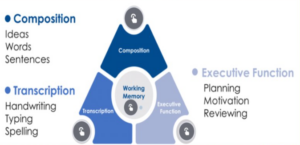Writing is a complex and creative process that develops over time through meaningful practice, explicit instruction, and purposeful feedback. Writing is integral to Curriculum for Excellence, enabling learners to communicate ideas, express identity, and engage critically with the world. Effective writing instruction involves developing learners’ writing composition, transcription, executive function and working memory. Teachers support writing development by providing rich language experiences, modelling the writing process, and offering opportunities for reflection and revision. By nurturing confidence, voice, and technical skill, we empower learners to become articulate, thoughtful, and resilient writers across the curriculum and beyond.
The Simple View of Writing

Composition
This refers to the creative and organisational aspects of writing—essentially, the ideas and how they are expressed.
What it includes:
-
-
Planning and structuring ideas
-
Choosing appropriate vocabulary and sentence structures
-
Organising content for purpose and audience
-
Developing tone and voice
-
Why it matters:
Strong composition skills enable learners to write for different purposes and audiences, as required by Curriculum for Excellence. Instruction should model effective writing strategies, encourage oral rehearsal, and provide opportunities for rich, purposeful writing.
Transcription
This covers the mechanical skills required to put words on the page fluently and accurately.
What it includes:
-
-
Spelling (phonics knowledge, morphology, visual memory)
-
Handwriting (legibility, speed, fluency)
-
Typing (in digital contexts)
-
Why it matters:
If transcription is slow or effortful, it can limit a child’s ability to express ideas. Teaching spelling rules, supporting handwriting fluency, and reducing cognitive load are key strategies.
Executive Function
These are the self-regulatory skills that help a learner manage the writing process.
What it includes:
-
-
Setting writing goals
-
Planning and organising ideas
-
Monitoring and evaluating writing
-
Revising and editing
-
Why it matters:
Executive function helps learners move beyond simply writing down thoughts to crafting and improving their writing. Scaffolds like writing frames, checklists, and peer feedback can support the development of these skills.
Working Memory
This refers to the mental space used to hold and manipulate information while writing.
What it includes:
-
-
Holding sentence structures or vocabulary in mind
-
Juggling multiple writing demands (e.g. spelling while composing)
-
Applying grammar rules while writing fluently
-
Why it matters:
Limited working memory can hinder writing fluency and coherence. Teachers can support learners by breaking tasks into manageable steps, allowing oral planning, and using visual supports like word banks or success criteria.

